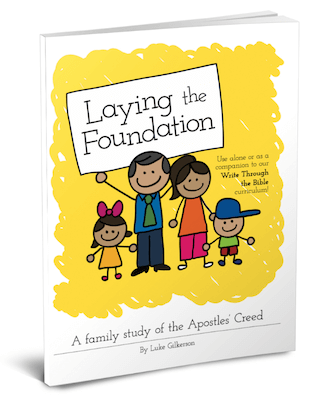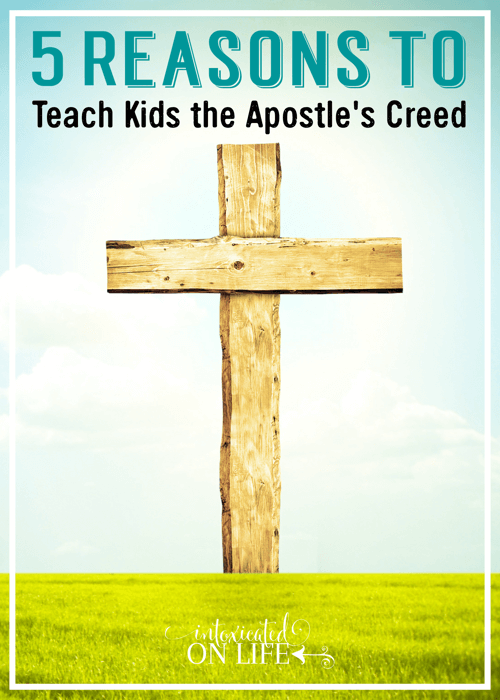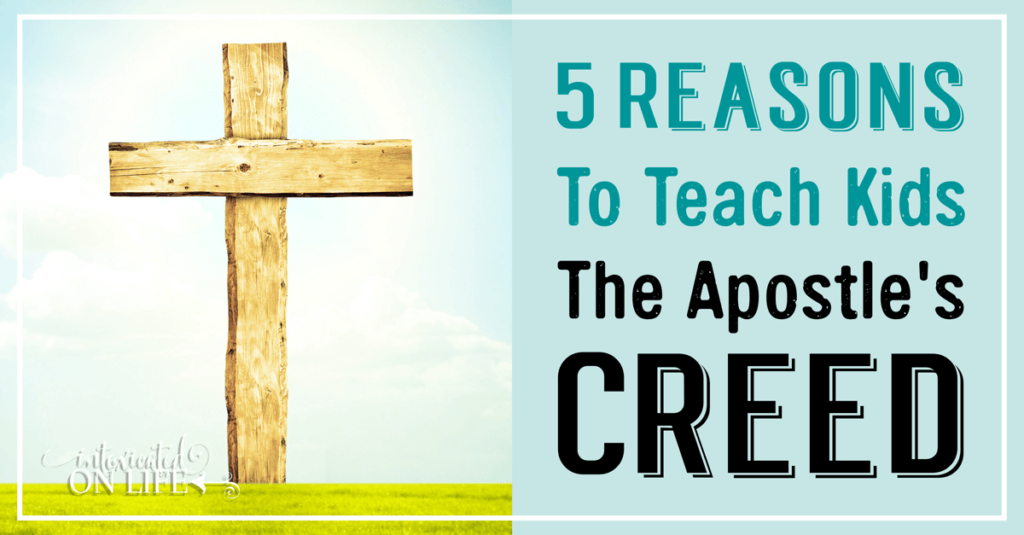Do you teach kids the Apostle’s Creed in your home?
About once a month, my church partakes of the Lord’s Supper, and when we do, we recite the ancient Apostles’ Creed together. Even my 5-year-old twins know it by heart.
Many Protestants are unfamiliar with the Apostle’s Creed. Others are offended by it—not so much because of what the Creed says, but the recitation of any human-written creed at all.
Should we even bother with the Apostles’ Creed today? Why should we teach kids the Apostle’s Creed?
I find it ironic we even need to be persuaded about this. The Apostles’ Creed is one of the oldest Christian creeds, confessed by believers as a summary of the faith for more than 1600 years.
I know parents who would painstakingly teach their children to memorize Bible verses, math facts, Latin vocabulary, and famous speeches, but would find the Apostles’ Creed a waste of time.
Why is the Apostle’s Creed worthy to take up space in our kids’ brains? Why should we teach kids the Apostle’s Creed?
Why We Should Teach Kids the Apostle’s Creed:
1. It teaches our kids that Christianity is “confessional.”
For the last couple hundred years, American Christianity has by-in-large moved away from the importance of creeds. In the interest of unity, some in the American Church want to be minimalists when it comes to doctrine. “Doctrine divides. Mission unites,” they say. Or, “No creed but Christ, no book but the Bible.” (Never mind that “no creed but Christ” is itself a kind of creed, but we won’t get into that now.)
This was not the attitude of Christ’s Apostles. The Apostles did not just write sacred Scripture; they also summarized essentials of the gospel in creeds. Examples include 1 Corinthians 15:3-8, 1 Timothy 3:16, and Philippians 2:6-11. Even the central confession of faith, “Jesus is Lord” (Romans 10:9), is a type of creed.
The Apostles taught the church to be confessional: to provide believers with formal, verbal summaries of the faith. When we teach kids the Apostles’ Creed, it continues that tradition.
2. The Creed connects our children to their Christian heritage.
The early church fathers, following in the footsteps of the Apostles, formulated what they called the “Rule of Faith,” a summary of essentials of orthodox belief—a summary they believed was passed down by the apostles themselves. For the early church, this was vital in a time before the canon of Scripture was formalized.
This “rule” was passed on via oral tradition through the second and third centuries, and while it varied in verbal forms, its content was essentially the same in churches everywhere: God created the world, Christ is the Son of God, born of the virgin Mary, born a real human being, lived in the time of Pontius Pilate, was truly killed by crucifixion, buried, and was raised to new life by the Father; he ascended to heaven and sits at God’s right hand; and he is coming against to judge the world and grant Christians eternal resurrection life.
The Old Roman Creed, codified in the late second or early third century, is a formal version of the Rule of Faith, and this eventually morphed into what we know as the Apostles’ Creed.
When we teach kids the Apostle’s Creed and have them memorize it, we can teach them that these are the truths our Christian ancestors lived and died for.
3. It teaches our children to value tradition and church history.
Many in today’s culture devalue the history of the early church. But as Christians, we should celebrate tradition.
Don’t confuse tradition with traditionalism. Jaroslav Pelikan wisely stated, “Tradition is the living faith of the dead; traditionalism is the dead faith of the living.” As Christians we should take joy in the living faith of those who came before us, those whose lives were radically changed by the gospel, who fought to pass the gospel on to the next generation.
Far from being a cold, lifeless text, church historian Philip Schaff says the Apostles’ Creed “is not a logical statement of abstract doctrines, but a profession of living facts and saving truths. It is a liturgical poem and an act of worship.”
4. The Creed has historically been foundational instruction for Protestants.
Confession of the Apostles’ Creed in the Roman Catholic Church is common, but it far from just a “Catholic thing.”
- When Reformer Martin Luther was compiling his Small Catechism for Christian families, he included three essentials: the Ten Commandments, the Lord’s Prayer, and the Apostles’ Creed.
- The Anglican Book of Common Prayer and the Heidelberg Catechism contain the same three essentials.
- It is also cited in full at the end of the oldest editions of the 1647 Westminster Shorter Catechism.
Luther said of the Apostles’ Creed, “Christian truth could not possibly be put into a shorter and clearer statement.” John Calvin set the Creed to music so it could be used for public worship. John Wesley called the Apostles’ Creed a “beautiful summary” of the essential truths of our faith, and when writing the evening prayer service for Methodists, he included the recitation of the Creed.
5. It gives our children essentials of the faith.
Creeds remind us that there are some beliefs worth fighting for. We should strive to rightly interpret and believe all God has revealed, but creeds help us to remember there are matters of “first importance” (1 Corinthians 15:3).
Most creeds are formed in times of heresy. As heretical sects arose in the church, the church fathers would point to the traditions passed down to them by the Apostles—and of course the New Testament writings of the Apostles—to crush heresies that were threatening the gospel.
Orthodox creeds like the Apostles’ Creed give our children accurate summaries of the essentials. And as heresies arise today, our children will be more equipped to say, “This is not what I was taught. This is not the faith handed down to us from Christ.”
This is why we should teach kids the Apostle’s Creed: it states in simple, Scriptural language the essential facts of our faith as God has revealed them, from the creation of the world to eternal life in the world to come.
Family Bible Study of the Apostles’ Creed

Also, as a part of our Write Through the Bible series, we have a series of handwriting workbooks, available in ball-and-stick, manuscript, and cursive fonts, so you can use the Creed for handwriting practice.
The Apostles’ Creed
I believe in God the Father Almighty,
Maker of heaven and earth.
And in Jesus Christ, His only Son, our Lord;
Who was conceived by the Holy Ghost;
Born of the Virgin Mary;
Suffered under Pontius Pilate;
Was crucified, dead and buried;
He descended into Hell;
The third day He rose again from the dead;
He ascended into heaven;
And sits at the right hand of God the Father Almighty;
From whence He shall come to judge the quick and the dead.
I believe in the Holy Ghost;
The Holy catholic Church, the Communion of Saints;
The Forgiveness of sins;
The Resurrection of the body;
And the life everlasting.
Amen.
More Bible Training Tips:
- 5 Read Aloud Story Bibles for Kids as They Grow
- 7 Ways to Develop a Prayerful Child
- 10 Reasons Why Your Kids Should Memorize the Ten Commandments
- 5 Ways to Create a Bible-Saturated Home
- What Catechism Should I Use with My Kids?












This is lovely and thoughtful. In our small country Protestant Christian church, we have a man who dearly values the creeds of our faith. I’ve pinned this to share with our worship team, because while some of our members are 20-something “children,” it would still be useful to present these truths behind our use of creeds. Blessings to you…stopping by from Happiness is Homemade.
Thanks, Elizabeth!
I first learned The Apostle’s Creed as a young teen in the Evangelical United Brethren Church with just a bit of different wording. Later we merged with the Methodist Church to become the United Methodist Church. We still say the Creed today with the same words I learned over 50 years ago. My son learned it as well. Good words to live by.
I agree. It is one of the best summaries of the faith ever composed.
Connie you may/may not see this but I wonder where you attended a UB church? I have attended a UB nearly all of my Christian life and we are a small group indeed. Blessings,
Dear Luke,
Thank you for sharing this post at Inspire Me Monday at Create With Joy!
I grew up in a faith tradition where we regularly recited The Apostles Creed, but in adulthood, having attended many churches, I’ve come to recognize just how important this creed and similar creeds are, for the reasons you state in your article.
I think it’s fabulous you’ve created a Bible Study based on The Apostle’s Creed – this sounds like an invaluable resource!
Have a very blessed Easter! 🙂
So glad you enjoy it!
Great teaching! R.C.Sproul has written a wonderful book on the creed that I found to be very helpful.
Yes. Great book!
As a Catholic I recite this one often, but I understand why many Protestants don’t feel comfortable with it. And I completely respect that.
Most translations state “one holy catholic church”, which of course would be off-putting to Protestants. But in this case it is the second not capitalized meaning, which is almost unknown today, of “including many different things” that is used. Basically it means we are all different but all unified in Christ. Which as Christians we should be, despite our varied faith traditions.
Thanks for sharing on Happiness is Homemade.
You’re welcome! Yes, the word “catholic” simply means “universal,” and the universal church (i.e. embracing all peoples everywhere) should be celebrated by Protestants everywhere. As a Protestant, when we recite the Creed, we use the word “catholic” (lower-case c) when we recite it.
We have a book that goes thru the lines and explains it to children. It uses “the holy Christian” church which I’m more comfortable with.
Probably less confusing than the term “catholic” (with a small c). I agree.
Great resource for children. This issue of this Catholic think in the Apostles creed is given attention by many because no one can underestimate the Catholic Church as the true church of Christ on earth. All others emulate the Catholic Church.
As Traditional Catholics, we say the Apostles’ Creed every evening as we say the Rosary. Our Catholic Faith is really meaningful to all of my twelve brothers and sisters and I, as well as our awesome parents, so that is why we spell Catholic with a capital “c”.
Yes, for Roman Catholics, it makes sense to capitalize the “c” because “catholic” is not just an adjective—it’s moniker for the true, universal church. For Protestants, “catholic” is more of a descriptive term for the whole body of true believers.
If you feel so glorious of Christianity by reciting the Apostle Creed, then why do you need of changing the Traditional Faith altogether and miss leading your children, for this Creed contains all what the Roman Catholics have been preaching and teaching all through out the centuries. sometimes its very funny to hear and see how the protestants are practicing their faith, at time they wants to practice what the R.C.C are on and some times they are confused what to do altogether. may be because there is no proper foundation in itself. when we say Universal Church we mean our universal practices and proclamation of Faith universally the same doctrine and same gospel. thank you. please do not mind i only shared my experience.
I’m not sure what you’re talking about here. I’m not sure why you think I feel “glorious” or what it would even mean to feel glorious. I agree that the Apostles’ Creed contains what Roman Catholics have taught, but it certainly doesn’t contain all Roman Catholics have taught—the Catechism of the Catholic Church is a substantially larger document than this Creed. I do agree that some Protestants are confused about how to practice their faith (at least as far as individual Protestants go), but I meet many Catholics who feel confused as well, so I’m not sure what you’re driving at exactly.
I think what George is saying, is why not be Catholic if you believe in the truths as set forth in the creed? I can’t think of any catechism of Christ’s church that a person couldn’t trace to a truth set forth in the creed. Like in algebra, if a=b and b=c then a=c, and all Catholic teaching is the truth as revealed by God. Take the catholic teaching on the real presence of Jesus in the consecrated eucharist and article 1 of the creed for example.
Unrelatedly, I take issue with one line in your article, that God raised Jesus from the dead, which is not how the creed puts it. I’ll have to go back and check my bible, but I believe in the triune God, three persons in one God, the trinity, and Jesus had all the power of God being God and rose from the dead himself, as stated in the creed and as he also ascended himself to heaven later.
I am catholic with a small c.
It’s one thing to say one should be part of the universal (catholic) church. It’s another thing to say one should be Roman Catholic. I know to a Roman Catholic the two are one and the same, but that’s a point that remains to be discussed here. The Apostles’ Creed is a shared statement of believe between Catholics and Protestants, and for that I’m very grateful.
As for who exactly raised Jesus from the dead, all persons of the Trinity were involved in the resurrection: Father (Gal. 1:1; Eph. 1:20), Son (John 2:19), and the Holy Spirit (Romans 8:11-13).